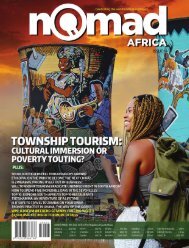Nomad_Africa_Edition12
Born from a passionate desire to dispel the negative perceptions which the world has held of the African Continent, and to replace it with a positive focus, Nomad Africa magazine celebrates life on the African continent. Covering stories from all countries and all cultures, it strives to include unique tourist attractions, business development, technology and investment opportunities as well as looking at the continent's cultural heritage. Nomad Africa inspires and breeds a conscious, knowledgeable generation of visionaries among our own, and influences positive perceptions and appreciation for the true worth of Africa worldwide.
Born from a passionate desire to dispel the negative perceptions which the world has held of the African Continent, and to replace it with a positive focus, Nomad Africa magazine celebrates life on the African continent. Covering stories from all countries and all cultures, it strives to include unique tourist attractions, business development, technology and investment opportunities as well as looking at the continent's cultural heritage. Nomad Africa inspires and breeds a conscious, knowledgeable generation of visionaries among our own, and influences positive perceptions and appreciation for the true worth of Africa worldwide.
You also want an ePaper? Increase the reach of your titles
YUMPU automatically turns print PDFs into web optimized ePapers that Google loves.
Jomo Kenyatta addressing graduates at Nairobi<br />
University on September 29, 1969.<br />
independence was declared and this was<br />
jubilantly celebrated on 12 December 1963.<br />
In 1964, Kenyatta had Parliament amend the<br />
Constitution to make Kenya a republic. The<br />
office of Prime Minister was replaced by a<br />
President with wide executive and legislative<br />
powers. Elected by the National Assembly,<br />
Jomo Kenyatta became head of State,<br />
head of Government and Commander-in-<br />
Chief of the armed forces. Under the provisions<br />
of the amendment, this enabled<br />
Kenyatta to automatically become President.<br />
Elected for three consecutive terms, Kenyatta<br />
enjoyed complete political control of<br />
his nation, but not without controversy. His<br />
authoritarian style, characterised by patronage,<br />
favouritism, tribalism and nepotism<br />
drew criticism and dissent, setting a bad example<br />
followed by his successor Daniel<br />
arap Moi in years to come.<br />
For instance, Kenyatta amended the Constitution<br />
radically to expand his powers,<br />
thereby consolidating executive power. His<br />
policies are also criticised, which led to a<br />
large income and development inequality<br />
gap in the country. Development and resource<br />
allocation in the country during his<br />
reign was seen to have favoured some regions<br />
of the country over others. The resettlement<br />
of many Kikuyu tribesmen in the<br />
country's Rift Valley province is widely considered<br />
to have been done unfairly under<br />
his government. One of his famous sayings<br />
is the following:<br />
“When the Missionaries arrived, the <strong>Africa</strong>ns<br />
had the land and the Missionaries had the<br />
Bible. They taught how us to pray with our<br />
eyes closed. When we opened them, they<br />
had the land and we had the Bible.”<br />
However, during the 1970s, advancing age<br />
kept Kenyatta from the day-to-day management<br />
of government affairs. He intervened<br />
only when necessary to settle disputed issues<br />
and this relative isolation resulted in increasing<br />
domination of Kenya’s affairs by<br />
well-connected Kikuyu who acquired great<br />
wealth as a result. His increasingly feeble<br />
health meant that his inner circle effectively<br />
ruled the country, and greatly enriched their<br />
own personal interests in his name.<br />
Well into his 80s, Jomo Kenyatta suffered a<br />
massive heart attack. Prophetically on 14 August<br />
1978, Kenyatta called upon his entire<br />
family, including his son Peter Muigai Kenyatta<br />
who flew in from Britain with his family,<br />
to a reunion in Mombasa.<br />
However, 22 August 1978 will be remembered<br />
as the day when President Kenyatta<br />
died in Mombasa of natural causes due to<br />
old age. Mzee Jomo Kenyatta was buried<br />
on 31 August 1978 in Nairobi in a state funeral<br />
at a mausoleum on Parliament<br />
grounds.<br />
Jomo Kenyatta left a substantial large family<br />
of considerable political influence. His<br />
fourth wife, the best known due to her role<br />
as First Lady, was Ngina Kenyatta (née<br />
Muhoho), also known as Mama Ngina. She<br />
bore Kenyatta four children: Christine<br />
Wambui, Uhuru Muigai Kenyatta, Anna<br />
Nyokabi and Muhoho Kenyatta. Mama<br />
Ngina lives quietly as a wealthy widow and<br />
is also one of Kenya’s wealthiest women<br />
due to her family’s political influence connections.<br />
Uhuru Kenyatta, Ngina and Jomo Kenyatta's<br />
son and political heir, unsuccessfully stood<br />
for the Kenyan presidency as President<br />
Moi's preferred successor in 2002, but was<br />
later successfully elected Kenya's fourth<br />
President in 2013.<br />
Jomo Kenyatta had much in common with<br />
the Ghanaian leader Kwame Nkrumah who<br />
both pioneered the break from colonialism<br />
and British rule, yet will also be remembered<br />
for selfish presidential rule, one party<br />
dictatorship, ethnicity and cronyism.<br />
Yet ,without such men, <strong>Africa</strong>n countries<br />
may have taken much longer to achieve<br />
self-determination and democracy thereby<br />
contributing towards propelling <strong>Africa</strong> into<br />
the 21st century.<br />
Jomo Kenyatta ruled in office from 1 June<br />
1963 until 22 August 1978 when he was succeeded<br />
by Daniel arap Moi.<br />
Issue 12 | ...Celebrating the world’s richest continent | www.nomadafricamag.com | 73





